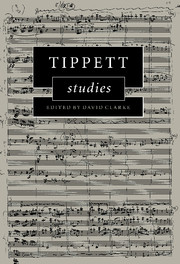Book contents
- Frontmatter
- Contents
- Preface
- References to Tippett's scores and essays
- 1 ‘Only half rebelling’: tonal strategies, folksong and ‘Englishness’ in Tippett's Concerto for Double String Orchestra
- 2 From pastiche to free composition: R. O. Morris, Tippett, and the development of pitch resources in the Fantasia Concertante on a Theme of Corelli
- 3 ‘Is there a choice at all?’ King Priam and motives for analysis
- 4 Tippett's Second Symphony, Stravinsky and the language of neoclassicism: towards a critical framework
- 5 Tippett, sequence and metaphor
- 6 Tonal elements and their significance in Tippett's Sonata No. 3 for Piano
- 7 ‘Significant gestures to the past’: formal processes and visionary moments in Tippett's Triple Concerto
- 8 Tippett's King Priam and ‘the tragic vision’
- 9 Tippett at the millennium: a personal memoir
- 10 Decline or renewal in late Tippett? The Fifth String Quartet in perspective
- Appendix: glossary of terms used in pitch-class set theory
- Index
1 - ‘Only half rebelling’: tonal strategies, folksong and ‘Englishness’ in Tippett's Concerto for Double String Orchestra
Published online by Cambridge University Press: 22 September 2009
- Frontmatter
- Contents
- Preface
- References to Tippett's scores and essays
- 1 ‘Only half rebelling’: tonal strategies, folksong and ‘Englishness’ in Tippett's Concerto for Double String Orchestra
- 2 From pastiche to free composition: R. O. Morris, Tippett, and the development of pitch resources in the Fantasia Concertante on a Theme of Corelli
- 3 ‘Is there a choice at all?’ King Priam and motives for analysis
- 4 Tippett's Second Symphony, Stravinsky and the language of neoclassicism: towards a critical framework
- 5 Tippett, sequence and metaphor
- 6 Tonal elements and their significance in Tippett's Sonata No. 3 for Piano
- 7 ‘Significant gestures to the past’: formal processes and visionary moments in Tippett's Triple Concerto
- 8 Tippett's King Priam and ‘the tragic vision’
- 9 Tippett at the millennium: a personal memoir
- 10 Decline or renewal in late Tippett? The Fifth String Quartet in perspective
- Appendix: glossary of terms used in pitch-class set theory
- Index
Summary
One of the greatest challenges facing musicologists is that of adequately interpreting the interpenetration of a composer's life and works. As the division of labour between music analysts and music historians makes plain (notwithstanding the potential deconstruction of this order by the emerging ‘new’ or ‘critical’ musicologies), explanation of the precise arrangement of actual notes and sounds in a musical work and reconstruction of the historical and biographical contingencies of its composition tend to resist conflation into a single narrative activity. I raise this dichotomy less to resolve than to explore it, in relation to Tippett's Concerto for Double String Orchestra (1938–9) and its status as the first work in the composer's œuvre to reveal his full creative stature. Decisive in the piece's aesthetic merit – happily reflected in its continuing popularity with audiences – is its cogent synthesis of a variety of musical influences that impinged on Tippett during the long process of his artistic maturation. Yet the dynamics of these musical forces, played out in the abstract inner space of an autonomous musical work, have their external counterpart in Tippett's socially rooted encounters with individual people – whom he knew either directly or through their writings – and with debates that shaped English musical culture at the time of his student years and the decade or so thereafter.
- Type
- Chapter
- Information
- Tippett Studies , pp. 1 - 26Publisher: Cambridge University PressPrint publication year: 1999



